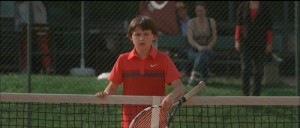 “Homo homini lupus” is the standard of our daily inferno. The entire capitalistic system is founded on this world vision, even though it’s masqueraded under the lambs wool of the politically correct.
“Homo homini lupus” is the standard of our daily inferno. The entire capitalistic system is founded on this world vision, even though it’s masqueraded under the lambs wool of the politically correct.
Even when we play our Ice Bucket Challenge to sensitize our skin to the horror of the disease with cold water, in reality we are just indulging in a little more than a narcissistic desire.
After all, today’s dominant cultural model definitely resembles a tennis match, where we are alone facing the opponent, and where our goal is to win our way to the net before the other does. Because we can be sure the other will eventually, if we let him.
So we measure our success based on ideas like job, money, social recognition, and we pretend we do not see who we trample on as we pursue our goals. Even worse, we are so accustomed to the lie we repeat to ourselves every morning, that we stop looking down, and even if we did, instead of corpses we would only see red clay (terre battue).
The apologue composed by Stephane Demoustier is disarmingly simple and has the same rigid composure of a tennis double in which you know from the very beginning who is going to lose.
On one side stand a father and his son, who are playing as well as they can the cards they were dealt by destiny. On the other side an unperturbed world returns every serve with the same mechanical fury of a ball machine.
The father was a company executive who had to quit his job. Too old to adapt to a too rapidly changing world, he is however determined to run his own business, in search of a model capable to outcompete even the Chinese.
The son is a young boy, disarmed as all boys his age, but equally determined to try and achieve success in competitive tennis. The father raised him according to the creed of success and throughout the film he spurs him to be just like him, ready for action, aggressive and cocky.
The two alternate at the net establishing a comradely routine that excludes everybody else. They do not realize until it’s too late that in reality the are not playing together, but against each other.
After all, tennis is not like soccer, which requires cohesive teamwork, or like the marathon, in which one is alone with oneself more than in competition with the others. Rather it is a form of civilized wrestling in which one must succumb for the other to be able to triumph.
It is a sport that not only brings solitude, but requires a full dose of rage if you really want to prevail. And sure enough little Ugo begins to win when his mother leaves her husband, tired of his fruitless projects. Success to him is a form of payback for life’s injustice. His hunger for success though can never be appeased because it is really rooted in his desire to please the father.
Terre battue builds up slowly on the parataxis of a shot/reverse angle played on the wire of the tennis court net. It collects episodes of ordinary life as if they were little tennis matches, with the same coldness of a tv commentary and all the spectator can do is sit and follow with his eye the ball run from one end of the court to the other.
Strangely the dynamic of oppositions breaks in the decisive moments to favor discreet long shots (like for instance the shot that sanctions the separation of husband and wife), as if to say that yes, the challenge is individual, but nonetheless failure is collective and invests the very sense of our social living.
In all this who pays the price is the young boy, rendered incapable to define a constructive relationship with reality and more and more isolated until he is finally pinned into the prison space of the last shot, when he is pushed for ever to the other side without a reason he can comprehend. This little homage to Truffaut’s Le Quatre cent coups, this indictment with no definite countershot, provides a measure of all the failure of the modern western civilization.
A society which imposes on all the verb of victory in the imperative tense, but in the end cannot teach us the most human thing – what sooner or later we all need to learn: how to lose, without forgetting how we got here.
(Translated from italian original by Maurizio Izzi)
Froma: Close-up
